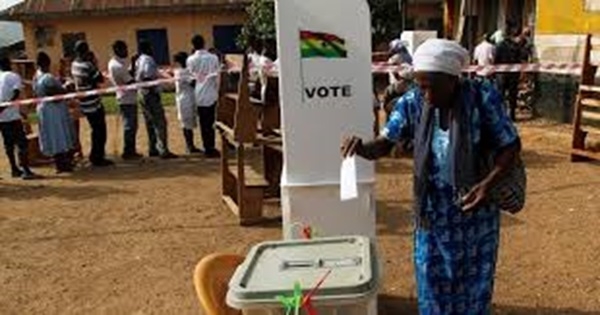Analysis of 2024 Presidential and Parliamentary results
 Voters casting their votes
Voters casting their votes
1.0 Introduction
The 2024 Presidential and Parliamentary Elections in Ghana marked a pivotal moment in the country’s democratic journey, with significant outcomes that reshaped the political landscape.
The National Democratic Congress (NDC) emerged as the dominant force, securing a decisive victory in the presidential election and achieving overwhelming representation in Parliament.
The election results highlighted the electorate's preference for change, as reflected in the NDC’s 56.55% share of the presidential votes and its capture of 188 out of 276 parliamentary seats, surpassing the two-thirds majority required for unilateral legislative action.
This outcome not only underscores the party’s strong mandate but also brings into focus critical areas of governance, including legislative dominance, executive oversight, and constitutional amendments.
This analysis explores the implications of the election results, focusing on the distribution of power between the NDC and the New Patriotic Party (NPP), voter turnout trends, and the legislative dynamics of Ghana's Parliament under the 1992 Constitution.
Additionally, it examines the challenges and opportunities presented by the NDC's parliamentary majority, emphasizing the need for inclusivity and collaboration to address entrenched constitutional reforms and foster national development.
2.0 Presidential Election Results
The 2024 presidential election in Ghana marked a decisive victory for the National Democratic Congress (NDC), which secured 6,328,397 votes, representing 56.55% of the total valid votes cast.
The New Patriotic Party (NPP), the main opposition, on the other hand, garnered 4,657,304 votes, representing 41.61% of the total valid votes cast.
This resulted in a significant vote margin of 1,671,093 votes, underscoring a decisive win for the NDC.
3.0 Voter Turnout and Participation
The voter turnout stood at 60.9%, reflecting moderate public participation in the electoral process.
However, the participation rate also highlights a concerning 39.1% of eligible voters who did not cast their votes, reflecting a significant level of voter apathy.
This phenomenon requires attention from political stakeholders to understand and address underlying causes, such as disillusionment or barriers to participation.
4.0 Composition of Parliament
The composition of Ghana’s Parliament following the 2024 elections is as follows:
· Total Seats: 276
· NDC: 188 seats (68.12%)
· NPP: 85 seats (30.8%)
· Independent Candidates: 3 seats (1.08%)
The NDC’s parliamentary dominance mirrors its presidential victory, securing a significant portion of the electorate’s confidence.
Votes in Parliamentary Elections
· NDC Votes: Approximately 6,328,397 (56.55%)
· NPP Votes: Approximately 4,657,304 (41.61%)
These figures affirm the consistency in voter support for the NDC across both the presidential and parliamentary contests.
5.0 Constitutional Powers of Ghana’s Parliament
Under Chapter 10 of the 1992 Constitution, the Parliament of Ghana is entrusted with substantial powers, including:
1. Legislative Authority: Enacting and amending laws to govern the nation.
2. Oversight Functions: Monitoring executive actions, including initiating votes of censure (Article 82).
3. Financial Control: Approving budgets and government expenditures (Articles 174-178).
4. Constitutional Amendments:
o Entrenched Provisions: Require a national referendum and parliamentary approval.
o Non-Entrenched Provisions: Amendable with a two-thirds majority (Article 291).
Parliamentary Transactions
Key requirements for parliamentary operations include:
1. Quorum for Business: At least 92 members (one-third) must be present (Article 102).
2. Quorum for Decision-Making: A minimum of 184 members (two-thirds) is needed for decisions (Article 104(1)).
6.0 Implications of the 2024 Parliamentary Results
· Legislative Dominance of the NDC
The NDC’s 188 seats surpass the two-thirds threshold of 184 seats, providing the party with a commanding legislative advantage.
This majority enables:
1. Legislation:
o Passing bills without reliance on NPP support.
o Amending non-entrenched constitutional provisions independently (Article 291).
2. Policy and Budget Control:
o Securing approvals for budgets and policies through a simple majority.
3. Ratification of Agreements:
o Independently ratifying treaties and international agreements.
4. Executive Oversight:
o Conduct oversight investigations and influence executive actions autonomously.
· Smooth Parliamentary Operations
The NDC comfortably meets the one-third quorum of 92 seats required for transacting business, ensuring seamless legislative operations without procedural delays.
· Areas of Influence With or Without NPP Support
1. Amendment of Non-Entrenched Provisions:
o Provisions related to administrative procedures and standing orders can be unilaterally amended by the NDC.
2. Policy and Budget Decisions:
o Budget approvals and policy implementations are secure with the NDC’s dominance.
3. Executive Oversight:
o Investigative and oversight functions are exercisable without external support.
7.0 Challenges
Despite its overwhelming legislative power, the NDC faces significant constraints in amending entrenched constitutional provisions.
Such amendments, addressing issues like sovereignty or judicial reforms, necessitate:
· A national referendum.
· Cross-party collaboration to achieve broader consensus, as outlined in Article 290.
8.0 Conclusion
The 2024 election results have firmly positioned the NDC as a dominant force in Ghana’s political landscape, both in the presidency and parliamentary representation.
With a robust mandate of 6,328,397 votes and 188 parliamentary seats, the party is well-placed to shape the nation’s legislative and governance trajectory.
However, fostering collaboration and inclusivity remains critical, particularly in addressing entrenched constitutional reforms, to promote long-term national cohesion and development.
Source: Classfmonline.com
Trending News

East Legon accident: See details of suspect driver Elrad Amoako's 6-month sentencing
23:00
Supreme Court: Anti-gay bill judgment expected today
11:13
December 7 election was a people’s revolution against an insensitive gov't – Ato Forson
14:44
Bawumia attends burial of late Ashanti Regional Chief Imam in Kumasi
17:21
John Dumelo begins MP duties ahead of swearing-in
12:26
We can’t repeat the mistakes of NPP; let's be different – Ato Forson to NDC
04:03
EC 'useless' press confab targeted at diluting NDC's parliamentary strength-Omane Boamah
17:58
We pray there will be no negative narratives under your gov’t – Duncan-Williams to Mahama
06:27
eTranzact and Npontu Technologies launch Ghana’s first AI and payments technology accelerator for Ghanaian start-ups
14:17
Increase betting tax to 50% to protect youth: ICS to President-elect Mahama
17:06



